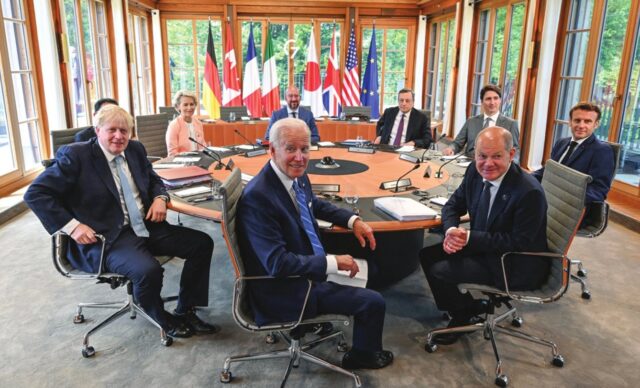The 48th G7 Summit 2022 was held in Schloss Elmau, Germany from 26th to 28th June under the chairmanship of German Chancellor Mr. Olaf Scholz. The leaders of the G-7 – Canada, France, Germany, Italy, Japan, the United Kingdom and the United States – made commitments on topics ranging from an increase in the share of coronavirus vaccines to tackling climate change and making corporate taxation even justified and fairer. The three-day meeting also concluded with a section on challenging China over “non-economic” economic practices and calling on Beijing to advocate human rights.
The respective leaders of the G7 countries agreed upon ending new direct government support for “unabated international thermal coal power generation” to reduce carbon emissions, coal must be used without technology and backed by a $2 billion coal transition fund. They also pledged to conserve at least 30% of the land and marine areas in their countries by 2030 as part of preserving global biodiversity. The leaders also agreed to increase financing for projects to curb climate change until 2025 and endorsed their support for a target of net-zero carbon emissions until 2050.
The G-7 leaders decided on working together to challenge China’s “non-market policies.” They also agreed to call on Beijing to respect human rights in Xinjiang. The leaders were steadfast about removing forced labour in global supply chains, “including state-sponsored forced labour of vulnerable groups and minorities.”
G-7 leaders authorised a global minimum tax of at least 15% on Multi-National Corporations (MNCs). This measure is expected to stop businesses from using tax resorts to shift profits and avoid taxes. This agreement was backed by a plan which was outlined earlier by the Finance Ministers of G-7.
Concerning global infrastructure, the leaders agreed on the purpose of “Build Back Better for the World.” This purpose calls for using funds in collaboration with the private sector to finance greener infrastructure projects in countries that are poor. This project is programmed to do better than China’s “Belt and Road” initiative, which funds a huge network of infrastructure covering major parts of Asia and Africa.
The G-7 leaders also reiterated the preparation for future pandemics. The leaders said that in the event of a future pandemic, they will look forward to ensuring the availability of safe and effective vaccines, treatment and diagnostic tests within the initial 100 days. British Government’s chief scientific advisor, Patrick Vallance said that a “100 Day Mission” report gave leaders recommendations for accelerating responses to another pandemic, however, he also acknowledged that any such response must be global and include even those countries that don’t belong to the G-7.
The leaders said COVID-19 has worsened the underlying inequalities and led to an education crisis, especially for the girl child. They expressed their commitment to getting 40 million more girls in school by 2026 in poorer countries and committed to a combined $2.75 billion in funding over the next five years for the Global Partnership for Education.
Germany has invited India, along with Argentina, Indonesia, Senegal, and South Africa to the 2022 Summit as partner countries. The guest countries were represented by their respective leaders, India was represented by Prime Minister Narendra Modi, Argentina by President Alberto Fernández, Indonesia by President Joko Widodo, Senegal by President Macky Sall and South Africa by President Cyril Ramaphosa. Ukrainian President, Volodymyr Zelenskyy also took part virtually on June 27 in the G-7.









